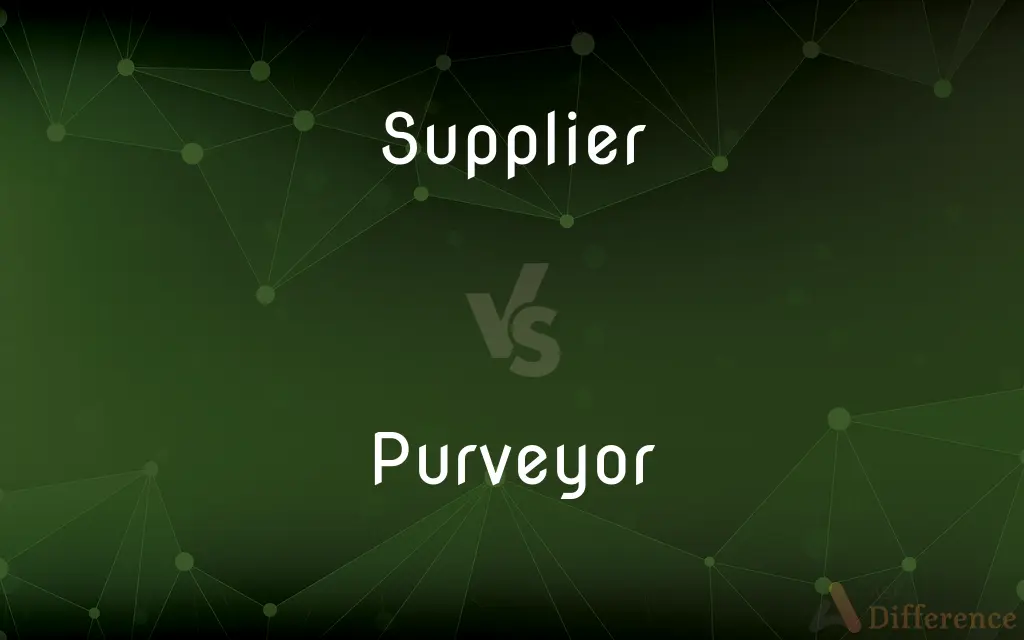Supplier vs. Purveyor — What's the Difference?
By Tayyaba Rehman & Fiza Rafique — Updated on May 6, 2024
Supplier refers to a broad category of entities that provide goods or services, often in bulk, whereas a purveyor specifically distributes supplies, typically food or provisions, often to organizations.

Difference Between Supplier and Purveyor
Table of Contents
ADVERTISEMENT
Key Differences
A supplier is a general term used for any entity that provides products or services to businesses or consumers. This can range from raw materials for manufacturing to retail products for consumer purchase. On the other hand, a purveyor traditionally refers to one who supplies food or other stores, especially to institutions like schools, hospitals, or restaurants.
Suppliers play a crucial role in various industries, offering a wide array of goods and services required to keep businesses operational. Whereas, purveyors are often associated with more specialized delivery of foodstuffs or perishable goods, catering specifically to the needs of large-scale consumers like hotels or event organizers.
The relationship with a supplier is typically transactional and can encompass a broad spectrum of interactions, from one-time purchases to long-term contracts. In contrast, purveyors often establish a closer relationship with their clients, sometimes tailoring their offerings to specific preferences or requirements.
While suppliers might deal with both businesses and the general public, purveyors are usually focused on business-to-business interactions. This distinction highlights how each operates within the market and their target demographic.
Suppliers are integral to the supply chain, impacting pricing, availability, and market trends based on their production and distribution capacities. Conversely, purveyors, while also influential, tend to affect more niche markets and specialized supply chains.
ADVERTISEMENT
Comparison Chart
Definition
An entity that provides goods or services.
A supplier specializing in provisions, often food.
Scope
Broad, covering all industries.
Usually specialized, commonly in food services.
Clientele
Both businesses and consumers.
Primarily businesses, especially large institutions.
Relationship
Can be transactional or contractual.
Often involves close, tailored interactions.
Market Impact
Affects broad market trends and supply chains.
Influences niche markets and specific supply chains.
Compare with Definitions
Supplier
A source for materials or resources needed.
That quarry is our main supplier of gravel.
Purveyor
Entity focused on fulfilling specific needs of businesses.
The company acts as a purveyor of cleaning supplies to schools.
Supplier
Entity that sells goods or services.
The company became the leading supplier of smartphone components.
Purveyor
Business specializing in the supply of food provisions.
The local purveyor delivers fresh produce to our restaurant daily.
Supplier
Firm that delivers essential services to a community.
They are the primary water supplier in the region.
Purveyor
One who supplies goods, specifically to institutions or large organizations.
As a purveyor to hotels, they focus on quality and timely delivery.
Supplier
Business that provides products to other businesses or consumers.
As a wholesale supplier, they offer better prices in bulk.
Purveyor
Provider in a specific niche market.
This purveyor is well-respected in the hospitality industry.
Supplier
Provider of ancillary support or technology.
They are a major supplier of IT solutions for small businesses.
Purveyor
Supplier of specialized goods, often gourmet or artisanal.
They are known as the purveyor of fine cheeses and wines.
Supplier
A person or organization that provides something needed such as a product or service
The company has to pay suppliers within 90 days of purchase
Suppliers of health care
Every major energy supplier upped their prices
Purveyor
One that furnishes or sells something, especially food.
Supplier
To make available for use; provide
Does the hotel supply towels?.
Purveyor
One that promulgates something
A purveyor of lies.
Supplier
To provide something necessary or desired to; furnish or equip
Supplied the players with uniforms.
Purveyor
Someone who supplies what is needed, especially food.
The merchants are the purveyors of fine selections.
Supplier
To have as a necessary or desirable feature
A crime scene that supplied valuable evidence.
Purveyor
An officer who provided provisions for the king's household.
Supplier
To fill sufficiently; satisfy
Supply a need.
Purveyor
(obsolete) A procurer; a pimp.
Supplier
To make up for (a deficiency, for example); compensate for.
Purveyor
One who provides victuals, or whose business is to make provision for the table; a victualer; a caterer.
Supplier
The act of supplying
Funds for the supply of the expedition.
Purveyor
An officer who formerly provided, or exacted provision, for the king's household.
Supplier
An amount available or sufficient for a given use; stock
Our supply of milk is low.
Purveyor
A procurer; a pimp; a bawd.
Supplier
Often supplies Materials or provisions stored and dispensed when needed.
Purveyor
Someone who supplies provisions (especially food)
Supplier
(Economics) The amount of a commodity available for meeting a demand or for purchase at a given price.
Supplier
One who supplies; a provider.
Supplier
(soccer) Someone who assists (sets up) a goal.
Supplier
One who supplies.
Supplier
Someone whose business is to supply a particular service or commodity
Common Curiosities
What types of businesses typically use purveyors?
Restaurants, hotels, hospitals, and other large institutions typically use purveyors for regular delivery of specific supplies.
Why might a business choose a purveyor over a general supplier?
A business might choose a purveyor for specialized needs, quality assurance, and tailored service offerings.
What is a supplier?
A supplier is any entity that provides goods or services, often on a large scale or to other businesses.
Can a supplier be a purveyor?
Yes, a supplier can be a purveyor if they specialize in specific supplies, such as food provisions.
How does a purveyor differ from a general supplier?
A purveyor usually specializes in providing specific types of goods, like food, often to businesses or institutions.
Is a purveyor more expensive than a regular supplier?
Not necessarily; prices depend on the specific products, market conditions, and the level of service provided.
How do suppliers impact an industry?
Suppliers determine supply levels, pricing, and access to goods, significantly impacting industry operations.
What should a business consider when choosing between a supplier and a purveyor?
Consider the business's specific needs, the quality of products required, and potential volume of orders.
What are the main advantages of using a supplier?
Suppliers often offer a wide range of products, competitive pricing, and the convenience of one-stop shopping.
What is the significance of the relationship with a purveyor?
The relationship can be crucial for ensuring quality, custom orders, and reliable supply, especially in industries like food service.
Do purveyors provide services other than food?
While commonly associated with food, purveyors can supply other provisions, such as linen services or janitorial supplies.
Can individuals use purveyors?
Typically, purveyors deal with businesses, but individuals might use them for large events or specific needs.
Are there regulatory differences between suppliers and purveyors?
Yes, depending on the industry and goods supplied, there might be specific regulations each must adhere to.
What trends are influencing suppliers and purveyors today?
Trends include sustainability, local sourcing, and increased demand for organic and artisan products.
How can a business verify the reliability of a supplier or purveyor?
Through references, reviews, trial orders, and verifying business credentials.
Share Your Discovery

Previous Comparison
Conduct vs. Attitude
Next Comparison
Scarlet vs. RubyAuthor Spotlight
Written by
Tayyaba RehmanTayyaba Rehman is a distinguished writer, currently serving as a primary contributor to askdifference.com. As a researcher in semantics and etymology, Tayyaba's passion for the complexity of languages and their distinctions has found a perfect home on the platform. Tayyaba delves into the intricacies of language, distinguishing between commonly confused words and phrases, thereby providing clarity for readers worldwide.
Co-written by
Fiza RafiqueFiza Rafique is a skilled content writer at AskDifference.com, where she meticulously refines and enhances written pieces. Drawing from her vast editorial expertise, Fiza ensures clarity, accuracy, and precision in every article. Passionate about language, she continually seeks to elevate the quality of content for readers worldwide.
















































